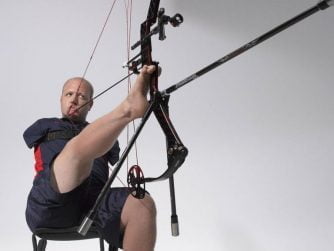Voice 1
Welcome to Spotlight. I’m Liz Waid.
Voice 2
And I’m Colin Lowther. Spotlight uses a special English method of broadcasting. It is easier for people to understand – no matter where in the world they live.
Click here to follow along with this program on YouTube.
Voice 3
“Once I knew only darkness and stillness. My life was without past or future. But a little word from the fingers of another person fell into my empty hand. And then my heart suddenly opened to the wonder of living.”
Voice 1
Helen Adams Keller wrote these hopeful words. Her childhood was dark and silent. Yet she became an encouraging writer and teacher for many people. Today’s Spotlight is on the writer and educator Helen Keller.
Voice 2
Helen Keller was born in 1880 in the United States. She was a healthy baby. But Helen became very sick when she was one and a half years old. No one knew what kind of sickness she had. Now, experts think she may have had scarlet fever or meningitis. Her sickness was very serious. Her family believed that Helen was going to die.
Voice 1
Helen did not die. She seemed to recover from her sickness. Her family was very happy. But all was not well. Helen’s mother saw that Helen’s behaviour had changed. Helen did not react to noise. She did not react to movement either. When Helen’s mother placed her hand in front of Helen’s eyes, Helen did not move. She could not see. She could not hear. The sickness had left Helen blind and deaf.
Voice 2
Life for Helen and her family was difficult. Helen became a troublesome child. She smashed things in the house. She was angry. She was intelligent but she had no way to communicate. By the time she was six years old, Helen’s family needed a new way to help her. They travelled to an institute for the blind. Doctors there said that Helen would never see or hear again. But the director of the institute told them not to lose hope. He said that Helen could learn. She only needed a teacher.
Voice 1
This teacher was Anne Sullivan. Anne was a 20 year old student at the institute for the blind. Anne had lost most of her eyesight at the age of five. At the institute for the blind she had operations on her eyes. Then she could see better. Anne went to live with the Keller family as Helen’s teacher. Later, Helen wrote:
Voice 3
“Alone we can do so little; together we can do so much. Walking with a friend in the dark is better than walking alone in the light.”
Voice 2
Anne changed Helen’s life. She showed Helen love and support. Helen began to trust Anne. Soon Helen’s behavior improved. Anne also began to teach Helen words. Anne used her finger to write the letters of words on Helen’s hand. Helen repeated the finger movements. But she did not understand the meaning of the letters and words.
Voice 1
Then, a small event changed Helen forever. One day, Helen and Anne were walking outside. They passed a water well. Anne took Helen’s hands. On one hand she wrote the letters w – a – t – e – r. On the other hand, she poured cool water. Suddenly, Helen understood the meaning of the word water. She now understood the symbols of language.
Voice 2
After this, Helen wanted to know more and more. Anne continued to teach her words and their meanings. Soon Anne taught Helen to read and write. Helen did this through her sense of touch. People were very surprised that Helen could read, write and communicate! This was not common for blind people in the 1800s. But Helen did not ever give up. She wrote:
Voice 3
“When we do the best we can, we never know what miracle is made in our life, or in the life of another.”
Voice 1
In 1900 Helen went to Radcliff College, in England. Helen became the first deaf and blind person to earn a Bachelor of Arts degree. At college Helen also began to write about her life. Helen wrote many books. Some of the books were about her life. Other books were about her Christian faith. Much of her writing was political.
Voice 2
Helen Keller saw that many blind people lived in poor conditions. Blind people did not get a good education. But Helen showed that it is possible for blind people to live happy, productive lives. She wrote,
Voice 3
“The public must learn that the blind man has a mind that can be educated. He has a hand that can be trained. He has dreams that are right for him to work towards.”
Voice 1
Helen was also very interested in justice for blind people in other countries. She travelled to 40 countries around the world. She gave speeches and brought hope to many people. The communities that Helen Keller visited increased their efforts for blind people.
Voice 2
Helen did not only work for justice for blind people. She did not like injustice of any kind. She worked for social rights, woman’s rights and for peace. She believed that God created all people equal. She thought that all people had equal rights to a good life. She said:
Voice 3
“The world is full of suffering. But it is full also of overcoming suffering. I am only one; but still I am one. I cannot do everything, but still I can do something.”
Voice 1
Helen Keller kept writing and giving speeches until she was an old woman. She won many awards and knew many famous people. But after she turned 80 Helen had some health problems. She moved back to her home and lived simply.
Voice 2
Helen Keller died peacefully at the age of 88. Her life brought hope and courage to millions of people. And she continues to encourage people all around the world with wise words such as these:
Voice 3
“True happiness is not found through helping yourself but through faithfulness to a good purpose… The best and most beautiful things in life cannot be seen or touched. They are felt in the heart.”
Voice 1
The writers of this program were Marina Santee and Rena Dam. The producer of this program was Rena Dam. The voices you heard were from the United States and the United Kingdom. All quotes were adapted for this program and voiced by Spotlight. You can listen to this program again, and read it, on the internet at www.radioenglish.net. This program is called, ‘The Amazing Life of Helen Keller’.
Voice 2
You can also leave your comments on our website. Or you can email us at radio@radioenglish.net. You can also find us on Facebook – just search for spotlight radio. We hope you can join us again for the next Spotlight program. Goodbye.
Question:
Have you ever seen someone use sign language or read someone’s lips? What do you think of this language?







this language interesting
Yes I have seen. In fact I have a deaf cousin that uses the sign language. It seems to me a really interesting way to comunícate and I would like to learn it.
Incredibly! Do you know the movie The Diving Bell and the Butterfly? I remembered him…
Gopd
Hi my name is sajad
welcome sajad
I am part of Feba radio station in Malawi and I wish we could use your programs since before we used to put in the program so we need to use these for especially those who want learn the English language. Thanks if this message will meet our expectations.
Much Blessings,
Amos
Greetings, Amos. We are glad that you like Spotlight. Although we don’t send programs to radio stations, we would be happy for you to use them on your station. All the best, Randy for the Spotlight team
English
Good
Thanks
Yes I have seen. In tv. the sign language. It seems to me a interesting
yes ,I saw to people using sign language .
It’s good language Because it makes all people able to communicate with each other
It’s very amazing things when you see someone doing amazing and unfamiliar thinks . Thanks for that
Thanks article showed the way to use sign language for deaf and blind persons. It’s really hard to study in poor conditions and need to patient.Helen Keller can do it and she becomes to the writer educator. She is an encouraging for people to live happy, positive thinking and attitude will drive you to success.
Yes, I have seen before when attended to sign language course.
No I have noy seen anyone using sing language.
I think that this languege is helpful for people with disabilities.
If all the western people believe that Allah is the god of as and Mohamed is the last prohet , plus these works and efforts may Allah give’s them the heaven.
2- It’s the same another languages
good
Yes I initially benefited
If you have a dream, you must make it come true. There is nothing stopping us, but some of us are lazy.☹️
very good
Yes I have seen someone using sign language, in our local television during the newspaper time there is small window at the bottom of the screen someone translate the newspapers into sign language
Thanks
I visited many times a church which use sign language: while they was worshiping, the preacher was preaching. Another situation when I saw someone using sign language is in the bus while a deaf students were communicating each other.
I think that this language is very interesting because I suppose when you use it it is very important to pay attention on your face and hands movements, even your mood.
I am a teacher of entrepreneurs and in my experiences I have had some people who had these kinds of limitations but they also showed us, their spirit with their entrepreneurial and business activities.
I think that these people need our support and special attention, even though many of them are self-sufficient.
Very good
Hello, thanks for this resource it is so usefel to learn English , At the same time we know the incredible stories.
Thanks again
You are very welcome!
alhamdulillah for everything, I see all disability people they have intelligent and patient.